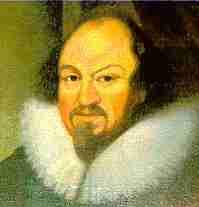Modern Ireland by R.F.Foster
Boyle was born at Canterbury in England on 3 October 1566 to a family with some means to their name but not enough that their ambitious son could expect to rely on them to pay his way in this World. Before completing his studies, Boyle decided "to gain learning, knowledge, and experience abroad in the world’ and left London for a new start in Ireland. He arrived in Dublin on 23 June 1588.
He proceeded to work his way up the ladder of public administration of English Rule over Ireland which was characterised by patronage, guile and corruption. It was a milieu well suited to the talents of Richard Boyle and one within which he made many enemies on his climb to the top. He was thrown into prison several times once on charges of fraud. He was also on one occasion charged with collusion with the Spanish – which was almost certainly false. But all his efforts came to naught in 1598 when the province of Munster (where he had most of his holdings) rose in Revolt against the English and he lost everything.
Forced to explain himself before the notorious Star Chamber in London he was lucky that Queen Elizabeth herself was in attendance that day and thought him hard done by. She famously said: "By God's death, these are but inventions against the young man" and she also said he was "a man fit to be employed by ourselves".
He was immediately appointed Clerk of the Council of Munster by Elizabeth I in 1600. In December 1601, Boyle brought to Elizabeth the news of the victory near Kinsale that gave the English Victory in the Nine Years War.
He was returned as a Member of Parliament for Lismore in 1614 and ascended to the Irish Peerage as Lord Boyle, Baron of Youghal, 6 September 1616, and was created Earl of Cork 26 October 1620. In 1629 he was appointed as a Lord Justice and in1631 he became the Lord Treasurer of Ireland.
All the time he was building up his land bank in Ireland, particularly in Munster and amassing a fortune through developing towns and estates that he planted with immigrants from England - when he could get them to come over. The town of Clonakilty was founded in 1613 by Richard Boyle when he received a charter from King James I. He acquired the town of Bandon in 1625 and other towns developed included Midleton, Castlemartyr, Charleville and Doneraile.
However in the 1630s he fell out with the new Viceroy Thomas Wentworth who viewed him as an over mighty subject who needed to be put in his place. He connived to bring Wentworth down as a man who was ‘A most cursed man to all Ireland and to me in particular.’ When Wentworth went before the axe in 1640 Richard Boyle might have thought his troubles were over but in 1641 the Irish again rose in revolt and once more Boyle risked the loss of everything he had built up. One of his sons was killed in battle at this time. He retreated to his fortified residence at Youghal and there waited out his last days.
His mansion in Dublin, on the site of the present City Hall, gave the name to Cork-hill. While the 1st Earl's remains are interred in a vault in Youghal there is another one in St Patricks Cathedral Dublin to his 2nd wife Catherine Fenton. Their brilliant son Robert Boyle is known as the 'Father of Modern Chemistry’. But Richard Boyle of Canterbury - the 1St Earl of Cork - was a man that took hold of an opportunity when he saw one - regardless of the legal niceties in his way. He lived by the family motto he had decided upon: "God's providence is my inheritance.".

No comments:
Post a Comment